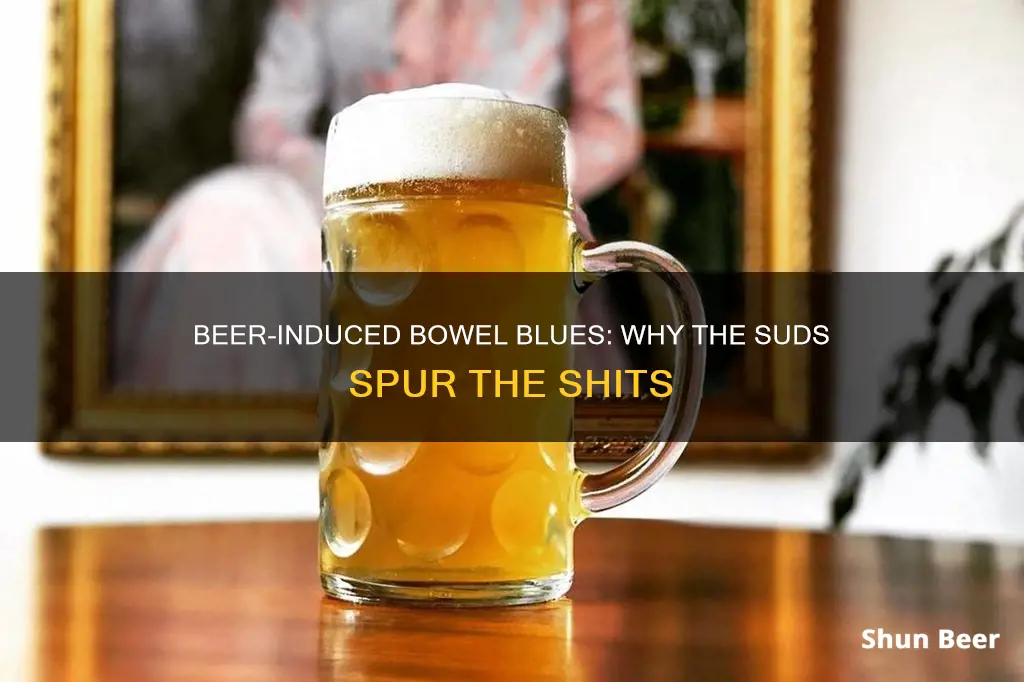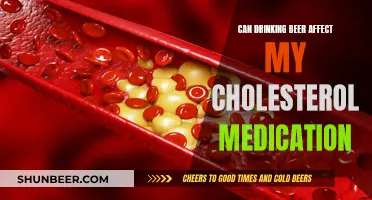
Drinking beer can cause a range of digestive issues, from mild discomfort to full-blown diarrhoea. This phenomenon is colloquially known as the beer shits. But what causes this unpleasant side effect of drinking beer? There are several factors at play, including the carbonation in beer, the fermentation process, and the effects of alcohol on the gastrointestinal tract.
Carbonation can lead to bloating and gas, stimulating the bowel muscles and causing an urgent need to use the restroom. The fermentation process can leave residual sugars and undigested carbohydrates in the beer, which act as fermentable fibres, promoting bacterial growth in the intestines and resulting in increased gas production and looser stools.
Additionally, alcohol irritates the intestinal lining, causing it to leak fluid and increasing the frequency and strength of muscle contractions. This can lead to watery stools as the intestines push waste through before they have a chance to absorb extra water. Alcohol also inhibits the body's ability to absorb water, contributing to dehydration and further exacerbating the problem.
What You'll Learn

Ethanol speeds up digestion
The ethanol in alcohol speeds up the digestive process. Ethanol revs up the digestive process, which is why you have the urge to go right when you wake up. Speeding up digestion also means there is less time for the colon to absorb water, which can lead to watery stool.
The bacteria in the large intestine will then have a field day fermenting the remaining carbohydrates, which results in gas, cramping, and more diarrhea. The high volume of carbs that comes with guzzling beer, coupled with an accelerated digestive process, means some of the carbohydrates may enter the large intestine without breaking down.
Drinking heavily puts people at risk for many adverse health consequences, including alcohol use disorder, liver damage, and various cancers. Ethanol metabolism in the liver can result in fatty liver and general metabolic dysfunction.
Beer and Metformin: What You Need to Know
You may want to see also

Carbonation and bloating
The grains often used to make beer, such as wheat and barley, are also hard to digest, which can worsen the bloating. Beer is also high in carbohydrates, which can be difficult for the body to break down, especially when consumed in large quantities. This can lead to an increased amount of carbohydrates entering the large intestine without being properly digested, resulting in gas, cramping, and diarrhea.
Alcohol, in general, can also contribute to bloating due to its inflammatory properties. It can irritate the stomach lining (gastritis) and cause excess gas, burping, and mild discomfort. Additionally, alcohol is dehydrating, and this dehydration can lead to water retention and bloating. Drinking enough water before, during, and after consuming alcohol can help reduce bloating and other digestive issues.
While beer may be a significant contributor to carbonation and bloating, it's important to note that other carbonated beverages, such as soda and spiked seltzer, can also have similar effects. However, beer's unique combination of carbonation, fermentation, and high carbohydrate content makes it a particularly potent culprit for causing bloating.
Beer After Running: Good Idea or Not?
You may want to see also

Alcohol irritates the intestinal lining
Alcohol also affects the tight junctions between epithelial cells, which are usually melded together to form a tight barrier. Acetaldehyde, for example, redistributes the proteins that make up these tight junctions, while alcohol and its metabolites alter the expression of the proteins and cause tight-junction redistribution, disrupting the barrier function.
Additionally, alcohol can influence the immune system, decreasing the innate immune response and triggering an immune response that promotes inflammation. This can lead to an increase in inflammatory immune cells, such as leukocytes and mast cells, as well as pro-inflammatory molecules like cytokines and interleukins. The inflammatory response, in turn, exacerbates alcohol-induced organ damage, creating a cycle of inflammation and organ dysfunction.
The effects of alcohol on the intestinal lining can vary depending on the amount consumed, with excessive drinking being more likely to cause irritation and damage.
Beer and C. diff: What You Need to Know
You may want to see also

Bacterial imbalance in the gut
Heavy drinking is associated with bacterial overgrowth, a decrease in Bacteroidetes, and an increase in Proteobacteria and Fusobacteria, endotoxin translocation, and inflammation, especially in patients with alcoholic liver disease. Alcohol can also irritate the lining of the intestines, making them leak fluid and increasing the frequency and strength of muscle contractions that trigger the urge to defecate.
However, it's important to note that not all alcohol affects the gut microbiome in the same way. Some studies have shown that moderate beer consumption may have a beneficial effect on intestinal health by increasing microbial diversity and the activity of alkaline phosphatase, an enzyme that helps defend the gut from harmful bacteria.
In summary, while the exact mechanisms are still being studied, there is a link between alcohol consumption, bacterial imbalance in the gut, and diarrhoea. The type of alcohol and the amount consumed play a role, with heavy drinking being more detrimental to gut health than moderate consumption.
Beer and Your Microbiome: Exploring the Connection
You may want to see also

Alcohol causes dehydration
Drinking alcohol can cause diarrhoea, also known as "the beer shits", and this can be attributed to several factors, including the ethanol in alcohol, which accelerates the digestive process. However, the focus here is on how alcohol causes dehydration.
Alcohol is a diuretic, which means it increases urine production. This diuretic effect is due to alcohol's interference with the body's ability to regulate water levels. Specifically, alcohol suppresses the release of the antidiuretic hormone vasopressin, which is responsible for retaining water in the body. With less vasopressin, the body loses more fluid through urination, leading to dehydration.
The dehydration caused by alcohol consumption can be exacerbated by drinking on an empty stomach, as food helps to slow down the absorption of alcohol. Additionally, large amounts of alcohol can suppress appetite, further reducing fluid intake and speeding up dehydration.
The risk of dehydration is higher for older adults and people with chronic conditions. To counteract alcohol-induced dehydration, it is recommended to consume alcohol in moderation, drink slowly, and alternate alcoholic drinks with water or other hydrating beverages.
It is important to note that alcohol can have other negative effects on the body beyond dehydration, including gastrointestinal problems, weakened immunity, and mental health issues. Therefore, drinking in moderation and ensuring adequate hydration are crucial for maintaining overall health.
Beer and Cancer: Is There a Link?
You may want to see also
Frequently asked questions
Beer and malt liquor are particularly bad offenders when it comes to causing diarrhea. The high volume of carbs that comes with guzzling beer, coupled with an accelerated digestive process, means some of the carbohydrates may enter the large intestine without breaking down. The bacteria in the large intestine then have a field day fermenting the remaining carbohydrates, which results in gas, cramping, and diarrhea.
The ethanol in alcohol speeds up the digestive process, which is why you have the urge to go right when you wake up. This speeding up of digestion also means there's less time for the colon to absorb water, which can lead to watery stool.
To prevent diarrhea after drinking beer, it's recommended to avoid drinking on an empty stomach. Food in your stomach slows the absorption of alcohol and provides a barrier, so alcohol is not as irritating to your digestive tract. It's also important to drink plenty of water or other fluids to keep yourself hydrated.







